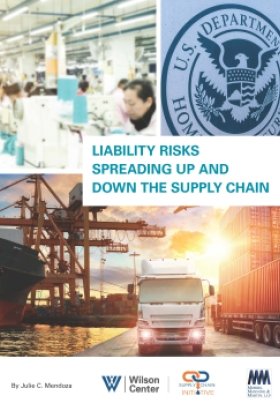Liability Risks Spreading Up and Down the Supply Chain

At the U.S. border, the federal government is deploying new tools to achieve a range of trade policy objectives, from prohibiting illegal logging to stopping the importation of products produced by forced labor. As a result, the risk of enduring disruptive investigations and incurring painful liabilities has increased dramatically for companies involved in international trade—not just importers of record (“IORs”), but all participants in the supply chain. Many of these risks are not well understood because of the rapid changes in the scope of importers’ and purchasers’ responsibilities, as well as the diverse nature of prohibited acts now enforced at the border.
This paper will explore laws and government policies that have intensified the enforcement risk in a particular area, broadened the number of supply-chain actors that face potential liability, or both. It describes the expanding risk of liability from trade-remedy actions (e.g., antidumping investigations) and the wider scope of U.S. Customs and Border Protection (“CBP”) enforcement actions under the Enforce And Protect Act (“EAPA”), a new framework that gives wide authority to CBP to investigate improper and/or illegal behavior
by entities that are involved in importing products to the United States.
The paper will also discuss CBP’s increased emphasis on preventing the import of goods produced with forced labor through the Uyghur Forced Labor Protection Act and other statutes that extend beyond the Xinjiang Uyghur Autonomous Region.
New legal requirements for parties beyond IORs are also on the horizon. CBP would like to place greater data-entry responsibility on “non-traditional” parties (i.e. IORs). Through the so-called 21st Century Customs Framework, CBP seeks to obtain information regarding importations as far in advance of entry as possible, stretching back to when goods bound for importation are manufactured and shipped.
Not surprisingly, there are a number of proposals to enhance compliance with environmental objectives. The newly released Green Trade Strategy would strengthen enforcement of existing environmental laws and proposed trade provisions, particularly on imports from countries with heavy carbon emissions.
Under U.S. trade law, U.S.-based companies are responsible for monitoring actors throughout their supply chain and must be prepared in the event of an enforcement action brought against them by the U.S. government. Much of the evidence needed to demonstrate that a transaction complied with trade regulations cannot be produced after the fact. For this reason, companies must set up procedures in advance to document that the company knows who it is dealing with, and that its entire supply chain is compliant.





